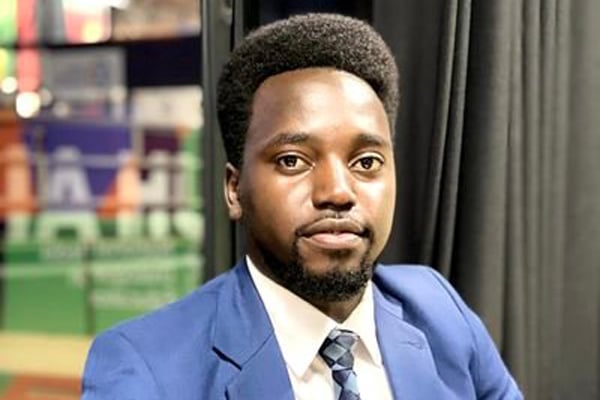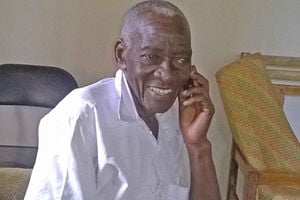
The late Ssalongo John Ssekandi. Photo | Courtesy
As Uganda embraced digital media, with expanded options to disseminate information such as death notices and memorials to a wider audience, Ssalongo John Ssekandi, who passed away on Monday at the age of 90, observed that this shift contributed to the decline of the once-popular radio announcements, a segment he was synonymous with.
Known fondly as Ssalongo John, Ssekandi was celebrated for his role as a masterful announcer of death notices on radio. His clear, emotive voice brought dignity to a task many found sombre but essential.
At the peak of his career, from the late 1960s through the 1990s, first on Radio Uganda and later on CBS FM and Super FM, he commanded a vast daily audience with his distinct, dramatic, and flawless delivery, broadcasting live during his three daily slots—morning, lunchtime, and evening.
Ssekandi earned the nickname Birango, translating to “announcements”, and his voice became a recognisable fixture on the airwaves. His impeccable Luganda accent and respectful tone set him apart, making his voice easily identifiable to anyone who had heard him.
“He delivered even the most sombre news with grace, ensuring that families’ announcements were treated with the utmost respect," Hannington Ndawula, an ardent listener from the 1970s, told Sunday Monitor. "His name evokes memories of a time when radio was the primary source of information, and his voice was a trusted companion.”
Mr Clean
Born on June 24, 1934, into a modest family as the first of six children, Ssekandi's life was shaped by early challenges.
His father, Joshua Settuba-Kadde, once employed at the government printer (now Uganda Printing and Publishing Corporation in Entebbe), lost his job after an injury, plunging the family into financial difficulties.
As a result, Ssekandi had to drop out of school at the age of 18, while in Junior Two at Luwuule Secondary School, and take on various jobs to support himself and his family.
He worked as a laundry attendant, made pancakes, and even engaged in construction, among other odd jobs.
His first foray into work was in laundry, a skill he learnt from his uncle, a launderer in Nakawa. Under his uncle’s guidance, Ssekandi became proficient in washing and ironing clothes. After eight months, his uncle secured him a job at a cooking oil factory, but he quit after just three days due to poor hygiene conditions. His uncle found him another job at a garage, but Ssekandi left after a single day, again citing cleanliness issues.
Ssekandi’s high standards for hygiene, shaped by his grandparents' influence and his early training in laundry, made it difficult for him to stay in jobs that did not meet these standards.
After leaving the garage, he returned to his father's home. However, with limited options, he eventually turned to construction, a trade where he felt he could balance hygiene with his work. It was here that he first found success.
One of his notable projects was the construction of the old Mukono Lands Office. His dedication and skills earned him income, allowing him to buy a piece of land for just Shs23, where he built his home in Nabuti, Mukono District. Over the years, he continued to improve and expand this property.
Ssekandi was involved in several significant construction projects, including the building of Luzira Prison and, at one point, Entebbe Airport. It was at the airport that he secured a new job as a telephone operator in 1956, a role he found fulfilling, especially since it allowed him to maintain his preferred level of cleanliness.
A year later, satisfied with his new job, Ssekandi married his first wife. Although their marriage lasted only four years, it resulted in the birth of twins, earning him the Ssalongo title.
Ssekandi's career at the airport was cut short following a confrontation with a foreign manager over racist remarks, leading to his dismissal.
However, he remained resilient and continued seeking new opportunities. At one point, he ventured into politics, driven by his loyalty to the king of Buganda. Unfortunately, this endeavour was short-lived due to the political unrest of the time.
Road to radio fame
A pivotal moment in Ssekandi’s life came in 1967 when he was encouraged by his former schoolmate, Moses Nkangi, to seek a job at Radio Uganda.
Despite having no formal training in media, Ssekandi's natural talent for oration shone through during an impressive audition. This ability, nurtured by his father—a preacher who instilled in him a strong reading culture by encouraging him to read Bible scriptures—secured him the position.
Ssekandi vividly recalled his first day on air. He was so nervous that he sweated profusely. Yet, his first broadcast became a defining moment that fortified his resolve. He brought a unique style to his shows, incorporating drama into his presentations, though not of the lighthearted kind.
Ssekandi’s calm, empathetic tone became his trademark, particularly when delivering death announcements—a sombre task he approached with both clarity and respect.
It was this ability to convey such news with a deep sense of compassion that won him a dedicated listenership, a recognition he later cherished as the highlight of his career.
During the era when Radio Uganda was the country’s sole broadcaster, Ssekandi's voice became synonymous with the solemn, yet dignified, reading of death notices.
His reputation drew more people to bring announcements of all kinds—be it lost property, events, or business notices—trusting that Ssekandi’s delivery would carry their message with the right tone and respect.
Seeking to further refine his skills, Ssekandi pursued a diploma from the International Institute of Business and Media Studies (IIBMS).
However, his journey was not without its challenges. Fame and talent brought their own share of difficulties. In 1975, he was arrested under mysterious charges, which he believed were linked to his vocal support for the Kabaka, a stance that did not sit well with President Idi Amin’s regime. He was detained for several months.
He was also accused of soliciting bribes to air announcements without going through the proper channels, allegations he vehemently denied.
Perhaps the most heartbreaking moment of his career came one fateful day when he had to announce the death of his own child live on air. A note was discreetly handed to him while he was in the middle of a broadcast, informing him of the tragic news. Despite his grief, he continued reading, his voice breaking as tears flowed. It was a moment that captured not just the strength of his character but also the depth of his humanity—even in his darkest hour, he sought to uphold his duty.
Short break, second coming
Upon his release from prison, Ssekandi was transferred to the Radio Uganda section in Nakasero, Kampala away from his previous post on Nile Avenue. Unhappy with the move, he resigned in 1976.
However, he later made a return to the airwaves were he stayed until 1994, when he clocked the retirement age of 60. He was brought back by Peter Sematimba two years later when CBS FM was launched, becoming one of the station's pioneer on-air personalities. He also had a brief stint at Super FM before retiring for good.
Ssekandi's influence extended beyond his own career. He mentored his daughter, Christine Nassozi, hoping she would uphold his legacy, though her journey in radio faced political obstacles.
Even in his latter years, Ssekandi stayed connected to the industry, voicing concerns about the changing dynamics, particularly the rise of comedy in serious segments, which he believed compromised professionalism.
FINAL DAYS
Ssekandi was a polygamous man, with multiple wives and many children. He often shared advice with his children about the challenges of managing a large family, drawing from his own experiences. After retiring from radio, he embraced farming on his six-acre land in Mukono, where he grew fruits and vegetables, enjoying a peaceful, quieter lifestyle. Tragedy struck when part of his land was encroached on, causing him to lose the commercial gardens he had established as his retirement project. This loss deeply affected him, leading to stress and worsening health. His condition further declined due to age-related illnesses, and a bathroom fall that fractured his femur ultimately led to his passing. Ssekandi was laid to rest on Wednesday in Bunankanda Village, Ntenjeru Sub-county, Mukono District
His commitment to high professional standards was part of him and it was non-negotiable.







